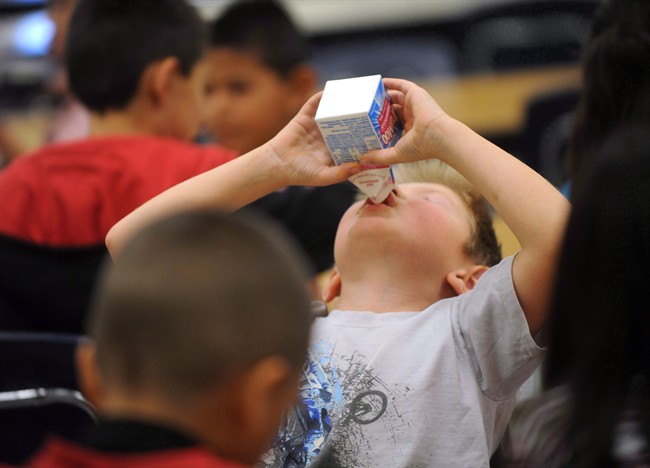Monitor children’s height, weight and body mass index, their fitness levels, lifestyle and eating habits, doctors are urging parents and pediatricians in new Canadian guidelines on preventing childhood obesity.

The recommendations – made by the Canadian Task Force on Preventive Health Care – are the first update to childhood obesity guidelines in more than 20 years. The guidelines for youth, published Monday in the Canadian Medical Association Journal, follow the task force’s adult obesity report released in January.
“Childhood obesity is complex – influenced by different parenting styles, family lifestyles and parents’ knowledge of what constitutes healthy growth,” Dr. Patricia Parkin, a SickKids Hospital doctor and chair of the child obesity guideline working group, said.
READ MORE: Canadian task force issues new guidelines on treating adult obesity
“Primary care doctors and other health care professionals play an important role in the battle against childhood obesity, which is a major health challenge in Canada. To be successful, we must involve the entire family and tailor solutions that meet their varied needs,” she explained.
The task force is combing over recommendations for a string of guidelines – Pap tests for cervical cancer, breast cancer screening and chronic conditions, such as diabetes, hypertension and obesity.
READ MORE: How this Danish doctor is battling childhood obesity around the world
This time around, they zeroed in on childhood obesity. Their recommendations include:
- Growth monitoring (height, weight and body mass index) should be done for all children and youth under age 18 during visits to the family doctor
- For children aged 2 to 17 years who are overweight or obese, family doctors should offer or refer to structured behavioural programs aimed at achieving healthy growth. This includes exercise, healthy eating as well as counselling and other support
- Medication to treat weight loss should not be offered to children or youth who are overweight or obese
- Surgery for overweight and obese children and youth is also not recommended
“Parents often underestimate their children’s weight, which is why continual growth monitoring by a health care provider is important,” Dr. Paula Brauer, another member of the working group, said.
READ MORE: This anti-obesity ad may scare parents into stashing the junk food away
“Children naturally gain weight as they grow – by regularly measuring and plotting a child’s growth, a physician or nurse can determine if the child is maintaining a healthy growth pattern or if he or she is at risk of being overweight or obese.”
While the task force is calling for more studies into tackling childhood obesity, research on the contentious and incredibly relevant subject is far and wide.
Plenty of research is pointing the finger at early childhood education and parents’ feeding habits as critical health factors.
READ MORE: Your child’s weight in kindergarten could predict obesity later on
Being overweight in childhood is often seen as a phase, a “baby fat” kids grow out of. But a study out earlier this year suggests that our weight by the time we enter school could predict our path into obesity as adults.
Kids who are overweight in kindergarten are four times more likely to become obese by their eighth grade graduation than their normal-weight counterparts, a U.S. study that followed the health of 7,000 students suggests.
READ MORE: Parents’ feeding habits may be increasing childhood obesity
In another piece of research, U.S. scientists wagged their fingers at busy, multitasking parents who cut corners and adopted habits that they say may be contributing to obesity in their children later on in life. The study suggested that some parents may be feeding their babies fruit juice, or leaving them in front of the TV with a bottle propped up to his or her mouth, for example.
The World Health Organization calls childhood obesity “one of the most serious public health challenges” of the 21st century.
By 2013, the number of overweight children under the age of five was estimated to be more than 42 million.
In 2007, Statistics Canada said 29 per cent of adolescents had unhealthy weights and if the trend continued, by 2040, up to 70 per cent of adults would be overweight or obese.
In the U.S. the Centers for Disease Control and Prevention pegs one in three kids as overweight.
Read the task force’s full recommendations in the CMAJ here.
carmen.chai@globalnews.ca
Follow @Carmen_Chai




Comments